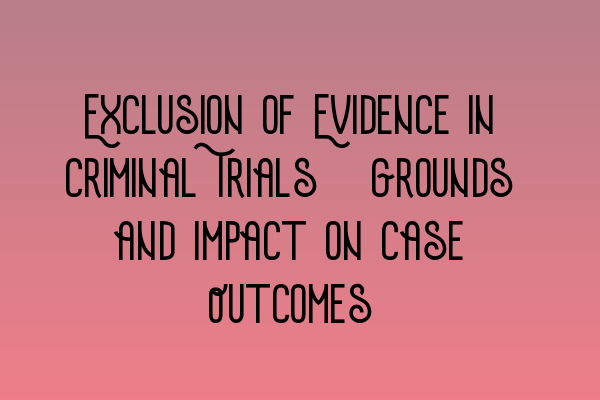Exclusion of Evidence in Criminal Trials: Grounds and Impact on Case Outcomes
Introduction
In criminal trials, the exclusion of evidence can have a significant impact on the outcome of a case. Various grounds exist for the exclusion of evidence, which must be carefully considered and argued by legal professionals. This article will explore the different grounds for excluding evidence in criminal trials and examine their implications on case outcomes.
Grounds for Exclusion of Evidence
There are several grounds upon which evidence may be excluded in criminal trials. These grounds include:
- 1. Improperly Obtained Evidence: Evidence that has been obtained in violation of the defendant’s rights or through unlawful means may be excluded from trial. This could include evidence obtained through illegal searches, coerced confessions, or violations of privacy laws.
- 2. Hearsay Evidence: Hearsay evidence, which is an out-of-court statement offered for the truth of the matter asserted, is generally considered unreliable and may be excluded unless it falls within an exception to the hearsay rule.
- 3. Unreliable Evidence: Evidence that is deemed unreliable, such as expert testimony lacking scientific validity, may be excluded to ensure a fair and just trial.
- 4. Prejudicial Evidence: Evidence that is highly prejudicial and likely to unfairly influence the jury’s decision may be excluded to prevent any potential miscarriage of justice.
- 5. Violation of Legal Privilege: Evidence that infringes upon legal privilege, such as attorney-client privilege or doctor-patient confidentiality, may be excluded to preserve the sanctity of these protected relationships.
Impact on Case Outcomes
The exclusion of evidence can have profound consequences on the outcome of criminal trials. When key evidence is excluded, the prosecution’s case may weaken, making it more difficult to secure a conviction. On the other hand, the exclusion of evidence can also benefit the defense by limiting the strength of the prosecution’s case and creating reasonable doubt.
In some cases, the exclusion of crucial evidence may lead to the acquittal of the defendant if the remaining evidence is insufficient to prove guilt beyond a reasonable doubt. Excluding evidence can fundamentally affect the balance of power between the prosecution and the defense, and it is the responsibility of legal professionals to effectively argue for the inclusion or exclusion of evidence based on the applicable grounds.
